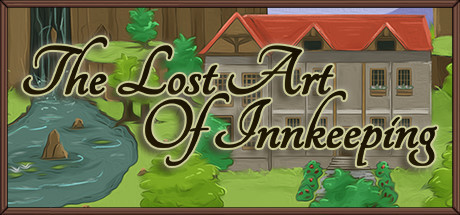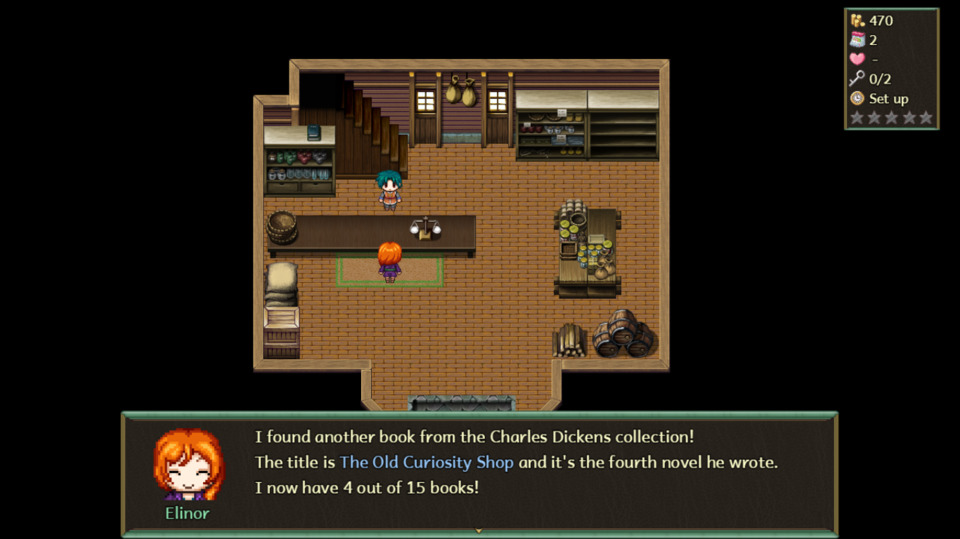Indie Game of the Week 181: The Lost Art of Innkeeping
By Mento 0 Comments

I'm sort of tying up a thread I began at the start of this month with the blog entry for Ara Fell (IGotW #177) where I ruefully reconsidered my stance on RPG Maker engine games and how I may have missed out by turning my nose up at them as a matter of course. The fodder of many a discount Indie bundle, most RPG Maker games are rudimentary facsimiles of JRPG classics back during the genre's 16-bit era heyday, with little narrative or mechanical innovation to call their own. However, that's not universally the case. I ruminated on this a little after writing about Ara Fell (originally made in RPG Maker 2003) and how there are so many other stand-outs I'd somehow forgotten about: weepy adventure games To the Moon and Rakuen, which used the top-down perspective to tell their stories without the engine's concomitant turn-based combat system; Yume Nikki and Corpse Party, which did something similar but with horror survival as the gameplay substitute; the exceptionally well-regarded LISA or Jimmy and the Pulsating Mass, two RPGs I've not yet played but plan to; and this week's entry, SeaPhoenix's The Lost Art of Innkeeping, which also utilizes the engine of RPG Maker MV in a way its developers Enterbrain could not have foreseen.
As the name suggests, the goal of The Lost Art of Innkeeping isn't to plunder dungeons as a burly adventurer but to be the welcoming home-away-from-home for same, with protagonist Elinor fixing up and repurposing an old manor her eccentric Aunt Agatha left her, turning it into a hotel in order to pay off Agatha's immense debts. As with another anime business simulator, Recettear, the game recommends playing with a strict month-long time limit in which to pay off your balance due, forcing you to make smart and frugal choices to ensure maximum profits (though a "relaxed mode" alternative is also available). As guests show up, you need to modify your vacant rooms to best suit their requirements and preferences, and the game's complexity grows further with the amenities: these are fixed costs that apply to every room, like providing breakfasts or hiring help, that might lower your income for that day but could help to improve your inn's reputation and may even be cancelled out by the additional tips you receive. The game also continually provides tasks for you to do, from high priority missions like earning the next highest star rating to smaller, narrative-focused goals like chasing away a ghost or digging deeper into your aunt's affairs to find out what happened to her supposed fortune.

I'm not going to say it's an overly dense game: events tend to play out in a specific order along with unlocking new areas, facilities, or amenities, and appeasing your clientele is fairly straightforward once you get used to everybody's schedules and what they're looking for, and the game's "world" is only a handful of screens from the rooms of your hotel to the local village and its establishments. You start gaining more money towards the end of the game as your hotel improves in stature and renown, and there's many opportunities to make even more money if you keep your ear to the ground. The game's achievement system gives you some idea of what other possibilities exist, with a few extra guests and surprises for new game plus, so there's some degree of longevity even if you make your goal target and pay off the bank in time on your first run. Though I successfully completed the game it felt a little touch and go for a while, especially as I stubbornly felt the need to reach for the more challenging achievements regarding completion states (like never raising the prices of rooms, which definitely cut into my bottom line). There's also the fact that almost the entire game is built from third-party graphical and audio assets either included with RPG Maker MV or found freely online: this isn't so much a condemnation but an indication of the developers' level of budget. Considering the whole game is about the challenges of making ends meet, I found myself a bit more sympathetic about utilizing "programmer graphics" than usual.
For all its budgetary flaws and shortcomings, The Lost Art of Innkeeping is capable of what life-sims like Stardew Valley do at their best: give you multiple reasons to get up in the morning. I'm speaking more figuratively, of course; there's plenty of little diversions beyond the gameplay core of arranging room furniture and wavering over hiring the chef and maid for the day despite the costs, and each fresh day tends to bring with it something new to check up on in the village, or a hint about a secret basement room, or the means to open up the entrance to a cave network behind the manor. New guests, though none are written particularly deeply, come with new recurring storylines and sets of variables to consider for their next visit, and spending money to make money is always a valid if worrisome consideration even if it's as minor as putting up curtains or giving the local baker cooking lessons. It's sweet, silly, only as stressful as the player wants to be, and full of enough ideas to fill its month-long calendar. I had a great time with it overall, and I could see it becoming a precursor to something much more in-depth and confidently built (with original assets, even) if it finds the support it deserves.
Rating: 4 out of 5.
| < Back to 180: MO:Astray | The First 100 | > Forward to 182: Mini Ghost |
